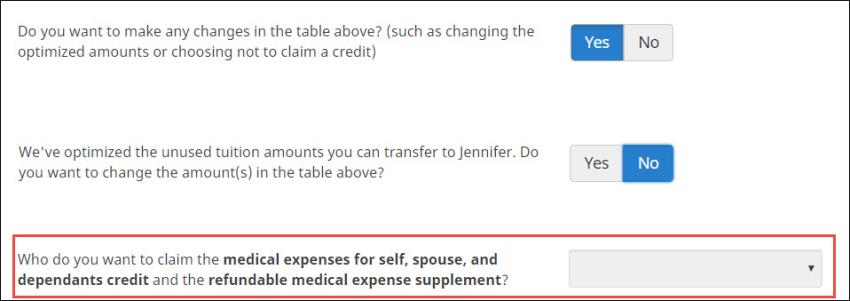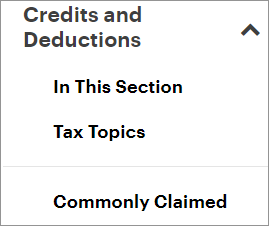
Important: Do not enter any medical expense amounts that you’ve already entered in box 85 of your T4 page or box 135 of your T4A page. H&R Block's tax software will automatically claim these amounts for you on your return. You only need to enter, on this page, the medical expenses that you haven’t entered anywhere else on your return.
You can claim medical expenses for any 12-month period ending in 2023 and which have not already been claimed in 2022 . For example, for the 2023 tax year, you could claim expenses paid in 2022 and in 2023 .
You can claim all or a portion of the medical expenses for which you’ve not been or will not be reimbursed. For example, let's say your health insurance plan reimbursed you for 80% of your medical expenses, you can only claim the remaining 20% on your return.
Note: The medical expenses you’re claiming can’t be used to calculate any other credit, including the disability supports deduction.
Some common eligible medical expenses include:
Note: Refer to the CRA website for a complete list of eligible medical expenses and the documentation you’ll need to claim these.
The amount you can claim for your medical expenses is the total expenses you paid minus either 3% of your net income or $2,635 , whichever is less.
If you are filing a return with your spouse or common law partner, you cannot split medical expense amounts. You can, however, choose who you’d like to claim the entire amount(s).
Tax tip: It is usually more beneficial for the person with the lower income to claim the amount.
To choose who will claim the medical expenses on the Wrap-Up tab, under Final Review , click Optimized Credits .

Select Yes in response to the question, Do you want to make any changes in the table above? (such as changing the optimized amounts or choosing not to claim a credit) and then indicate who will claim the medical expenses.

If you’re eligible to claim the federal medical expenses amount, you’re also entitled to claim a corresponding provincial tax credit, which might vary in amount depending on the province or territory you live in:
Yes. According to the CRA, if you or a family member suffer from a prolonged mobility impairment and moved to a house that’s more accessible or functional, you can claim reasonable moving expenses (up to $2,000). Having said that, these amounts can only be claimed as a medical expense as long as they haven’t been claimed as moving expenses on your, or someone else’s return.
If you travelled more than 40 km one way from your home to get medical services, you’ll be able to claim certain expenses as medical expenses on your tax return.
Note: Expenses paid for travel less than 40 km one way are not eligible for this tax credit.
For example, if you travelled more than 40 km but less than 80 km one way to get medical services, you can claim the cost of the public transportation expenses (for example, taxis, bus, or train).
If you travelled more than 80 km one way from your home, you can claim the cost of travel expenses such as accommodations, meals, and parking.
In both cases, you can claim your travel expenses if:
If you also qualify for the northern residents deduction, you might be able to choose how to claim your expenses. Refer to the CRA website for more information on the northern residents deduction.
Yes. If you were required to pay premiums for Québec's public prescription drug insurance plan (RAMQ) in 2022 , you can claim these contributions as a medical expense on your 2023 federal return. To do this, enter the amount from line 447 of your 2022 Québec return in the field on the Medical expenses page.
Follow these steps in H&R Block’s 2023 tax software to claim eligible medical expenses for yourself or your spouse or common-law partner, or for your dependant child under 18.

You'll only see a difference in your refund or tax owing amount if you have a significant amount of medical expenses. Your medical expenses must be more than $2,635 , or 3% of your net income (whichever is less) for the amount to make a difference to your refund or tax owing.
For example, let’s say your 2023 net income is $30,000. On October 1, 2023 , you paid $300 for prescription glasses and that was your only medical expense for the year. Since your medical expense is less than 3% of your net income, entering this amount on your 2023 tax return won’t make a difference to your refund or tax owed.
2023 Net income = $30,000
2023 Medical expenses = $300
$300 - $900 = –$600 -- a negative amount can’t be claimed
However, since medical expenses paid in any 12-month period ending in the tax year are claimable, you might be able to combine the above expense amount with other medical expenses you’ll have next year and claim it on that year’s return.
| October 1, 2023 | $300 for glasses |
| February 10, 2024 | $500 for prescriptions |
| June 5, 2024 | $1200 for dental services |
| Total medical expenses from October 1, 2023 to October 1, 2024 | $2,000 |
2023 Net income = $30,000
$2,000 - $900 = $1,100 -- your 2024 claimable medical expenses amount
You might see an amount for medical expenses on your return, even if you didn’t enter it on the Medical expenses page in H&R Block’s tax software. This occurs if you paid premiums to a private health services plan through your payroll and this amount was included in box 85 of your T4 slip or box 135 of your T4A slip.
These amounts qualify as medical expenses and H&R Block’s tax software automatically claims them for you when you enter them on the T4 or T4A page of your return.
If you or your spouse or common-law partner received fertility treatment in 2023 from a licensed medical practitioner or infertility treatment clinic in Manitoba, you might be able to claim the Manitoba Fertility Treatment Tax Credit, equal to 40% of the costs of treatment. You can claim up to $20,000 for a maximum of $8,000 per year. There’s no limit on the number of treatments you can claim, as long as the amount claimed isn’t more than the maximum yearly amount.
Note: Either you or your spouse can claim this tax credit but it can’t be split between you both.
You can claim the Manitoba Fertility Treatment Tax Credit if:
Note: You can’t claim a credit for fertility treatments outside of Manitoba but you can claim any costs from follow-up treatments by a Manitoba physician.
Some examples of treatments that you can claim include:
Keep in mind, this isn't a complete list of eligible treatments. Click here to see which expenses and treatments are eligible.
Note: You can only claim eligible expenses that weren’t reimbursed to you already (for example, by a private health care coverage).
Follow these steps in H&R Block's 2023 tax software:
Before you begin, make sure you tell us that you lived in Manitoba on December 31, 2023 .
